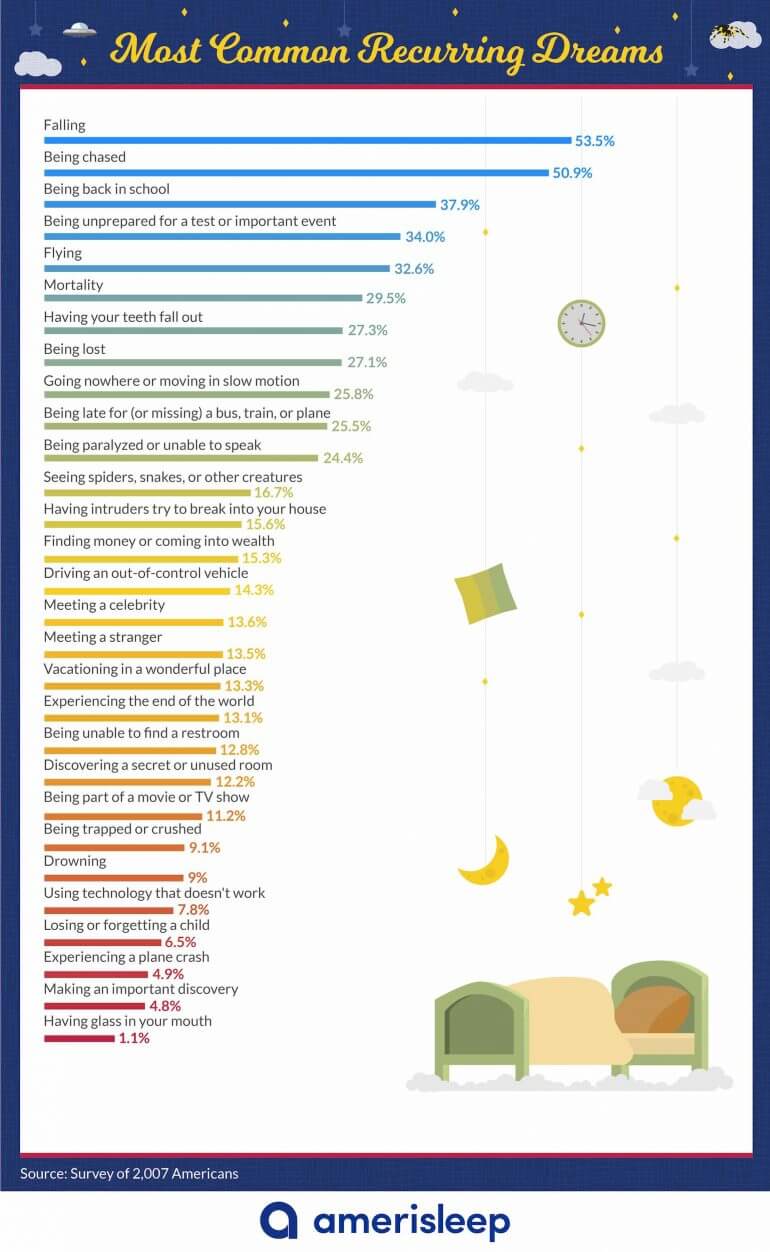Fear of Failure Dreams are a phenomenon that has been widely reported. These dreams may be due to anxiety or a change in sleep patterns as many adjust to working and living in today’s more stressful environment.

Key Takeaways
- Fear as a Motivator: Fear of failure is a bad thing, but it can actually be a catalyst for growth and self improvement. By reframing fear and using it to motivate you to take action you can overcome self doubt and go after your big dreams.
- Be Vulnerable: Sharing your failures and challenges can build trust and relatability. This openness can strengthen your professional relationships and create an environment where people feel safe to take risks and go after their dreams.
- Turn fear into action: focus on the process not the outcome, get support, take small steps outside your comfort zone. With a growth mindset and seeing failures as learning opportunities you can build resilience and get closer to your dream life.
Frankly, I wish I were having those vivid, exciting dreams. I continue to be plagued with a recurring dream, and it does comfort me to know, though, that many adults also experience recurring dreams, and some have had the same dream since they were children. When I mentioned my recurring dream to a few lawyer coaching clients, I was surprised (and a bit relieved) to hear that many of them have the same type of dream as I do.
Mine begins with a certified letter from the Board of Law Examiners informing me that, upon an arbitrary review of my application, they have discovered I failed one of my final semester courses and should not have sat for the bar exam. My heart begins to race as I realize that if I failed a course, I should not have been licensed. Worse still, I have been practicing for over three decades and must now disclose that I am an imposter!
I wake up in a panic before I think… wait. I did graduate. I did pass the bar. My whole career is not a sham. I have a place at this table. I belong. This is just fear speaking to me—no, shouting at me!
Fear of Failure Dreams: Most Common Recurring Dreams

Fearing failure, both consciously and subconsciously, is a normal part of the human experience. A few years ago, the Sorbonne University in Paris published a study in which more than 700 people sitting for a medical school entrance exam were surveyed about their dreams the preceding night. Of the 700 tested, more than 60% dreamed about the exam. Of those who dreamed about the exam, 78% reported that their dreams were negative. The most commonly reported themes spanned insufficient preparation, logistical issues (like not being able to find the exam room), and arriving late.
But here is the really interesting part. The researchers discovered that students who dreamed about the exam the night before—whether those dreams were positive or negative—performed better than those who did not. This was also true of the period leading up to the exam: The more frequently the students reported dreaming of the exam during the term that preceded it, the stronger their scores.
It seems the subconscious fear of the exam was a motivating factor for these students. If that is indeed true, then I propose that we can change the fear narrative and use the fear of failure to catalyze self-improvement.
Understanding the Fear of Failure
Fear of failure is a universal human emotion that stops us from going after our dreams and achieving our goals. It’s a natural response to the unknown, often triggered by not meeting our expectations or not being good enough. But fear is not fixed and can be overcome with the right mindset and strategies.
One of the main reasons we fear failure is the fear of the unknown. When we face a new situation or challenge our minds go to the worst case scenario and we doubt ourselves. Self doubt can be paralysing and stop us from taking the first step towards our goals. But we need to realise that this fear is not about our worth or ability. By acknowledging this we can start to reframe our fears and take action towards our dreams.
The Psychology of Fear
Fear is complex, it’s influenced by our upbringing, experiences and environment. Our brains are wired to respond to fear as a survival mechanism to threats or dangers. But this response can also be triggered by irrational fears like the fear of failure.
One of the key psychological principles that can help us overcome the fear of failure is self compassion. When we’re kind and understanding to ourselves we can reframe our failures as opportunities for growth and learning. This mindset shift can help us develop resilience and perseverance which are essential to achieve our goals. By practicing self compassion we can change our relationship with failure and start dreaming big again.
Turning Fear into Action: Practical Steps
It will take some work but if you can reframe failure, look at a bigger picture and see vulnerability as a strength not a weakness I think it will lead to a more successful, connected, fulfilling career. Here are some practical steps:
- Acknowledge and Analyse the Fear: Instead of dismissing these dreams or feelings of inadequacy acknowledge them. What specific fear is being triggered? Is it fear of not being good enough, of disappointing others or of losing something you’ve worked for? Writing it down will help you understand it better.
- Reframe the Story: Once you’ve identified the fear, challenge its truth. Are these fears based on real facts or worst case scenarios playing out in your head? Reframe negative self talk with positive affirmations. For example instead of “I will fail” try “I can handle whatever comes my way”
- Focus on the Process not the Outcome: Often the fear of failure comes from focusing too much on the end result. Shift your focus to the steps you’re taking to get to your goals. This will allow you to celebrate small wins and build momentum and reduce the fear.
- Growth Mindset: See challenges as opportunities for growth. See mistakes as learning experiences not personal failures. This mindset shift will change your relationship with failure.
- Get Support and Mentorship: Talk to trusted colleagues, mentors or coaches about your fears. Sharing your vulnerabilities will help you see things differently and realise you’re not alone. They can also offer valuable advice and support.
- Take Action even when you’re scared: The best way to overcome fear is often to face it. Take small steps outside your comfort zone and you’ll build confidence and reduce the fear.
Embracing these steps can help you overcome your fears and take courageous steps toward realizing your big dreams.
Reframing Failure to Catalyze Personal and Professional Growth
Rather than viewing failure as the opposite of success, can we accept it as merely a slight dip in the very long curve that represents our career trajectories? By taking proactive steps to understand and manage our fears, we can transform them from a source of anxiety into a powerful catalyst for personal and professional growth.
Embracing a Broader Perspective
When you face a personal setback — whether in real time or subconsciously in a dream — step back and broaden your lens. Putting failure into perspective requires recognizing and acknowledging that you are not alone. Some of the most successful and beloved people in the world have built their careers upon a pile of failures.
- Oprah Winfrey was fired from her very first television job.
- Walt Disney ran several failed companies before launching Disney.
- The very first book in the Harry Potter series was rejected 12 times.
- Before becoming the 16th president of the United States, Abraham Lincoln failed in business and lost multiple elections for the state legislature and Congress.
So next time you fail, remember you’re in great company.
Channeling Our Humanity, Accepting Our Vulnerability
People like those they perceive as human. They appreciate knowing that you are imperfect because they are, too. Knowing that you manage your own host of challenges and setbacks makes you relatable personally and professionally.
Unfortunately, many professionals (especially lawyers!) believe admitting to their imperfections is inappropriate or makes them seem weak. So, they hide their mistakes and avoid discussing their challenges. Let me propose an alternative school of thought: The more you share a holistic, human version of yourself, the more comfortable others will feel confiding in you, trusting you and respecting your authority as a professional and a leader. The power that stems from this vulnerability will impact colleagues within your firm or organization as well as your clients. And who doesn’t want clients who trust their lawyers deeply?
Facing Failure Positively
Learning to embrace failure as an opportunity rather than a maligned hit to your career takes work. It is like strengthening a muscle. However, when you feel yourself sliding into fear, remember the Sorbonne study. Fear of failure is a tool that can help you work toward unprecedented growth. So sit back, breathe and remember: The fear of failure can be your new ticket to a successful, connected, fulfilling career.
Illustration ©iStockPhoto.com
Also on Attorney at Work …
“5 Ways to Reduce Anxiety in a Worldwide Pan(dem)ic”
“Your Chronic Stress: It’s a Matter of Confidence, Not Competence”
“Pushing Past Fear and Failure (from ’50 Lessons for Women Lawyers’)”
“In Search of a Perfect Record: The Price of Trying to Be the Best”
















